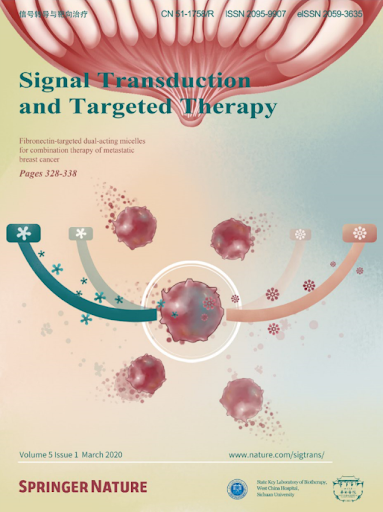Safety and immunogenicity of an HIV vaccine trial with DNA prime and replicating vaccinia boost.
IF 52.7
1区 医学
Q1 BIOCHEMISTRY & MOLECULAR BIOLOGY
引用次数: 0
Abstract
Developing a safe and effective vaccine remains a global priority for ending the human immunodeficiency virus (HIV) pandemic. All HIV vaccine trials with protein, DNA, non-replication vector or their combinations failed in the past. We constructed the HIV-1 CN54 env, gag, and pol genes into both DNA and replicating vaccinia virus Tiantan vectors. In phase Ia, 12 healthy adults were given high (n = 6) or low (n = 6) doses of recombinant vaccinia virus Tiantan vaccine (rTV), to test its safety dose. In phase Ib, 36 healthy adults were assigned to the DNA (n = 6), DNA-L/rTV (n = 12), DNA-H/rTV (n = 12), and placebo (n = 6) groups. The DNA vaccine was injected intramuscularly at weeks 0, 4, and 8 and rTV with a bifurcated needle at week 12. All vaccines tested were safe and well-tolerated; most of the adverse events (AEs) were mild to moderate. The most commonly observed AEs were redness and papule at rTV vaccination sites and axillary enlarged lymph nodes at the same rTV vaccination arm. Smaller cutaneous lesions and shorter healing time were observed in smallpox vaccine experienced subjects. The DNA prime-rTV boost regimen induced anti-gp120 IgG and polyfunctional CD4+ T cells. No significant differences of anti-HIV IgG and T cell responses were found between the two prime-boost groups with high and low DNA doses. Moreover, smallpox vaccine naïve subjects elicited higher T cell responses and anti-gp120 antibodies. The result of this trial supports further development of HIV vaccine with DNA and replicating vaccinia vector for advanced clinical trials.DNA引物和复制痘苗增强的HIV疫苗试验的安全性和免疫原性。
研制安全有效的疫苗仍然是终止人类免疫缺陷病毒(艾滋病毒)大流行的全球优先事项。过去,所有用蛋白质、DNA、非复制载体或它们的组合进行的艾滋病毒疫苗试验都失败了。我们将HIV-1 CN54的env、gag和pol基因构建到DNA和复制痘苗病毒天坛载体中。在ⅰ期试验中,12名健康成人分别接种高剂量(n = 6)和低剂量(n = 6)重组痘苗病毒天坛疫苗(rTV),以检测其安全性。在Ib期,36名健康成人被分配到DNA组(n = 6)、DNA- l /rTV组(n = 12)、DNA- h /rTV组(n = 12)和安慰剂组(n = 6)。在第0、4和8周肌肉注射DNA疫苗,在第12周用分岔针注射rTV。所有测试的疫苗都是安全且耐受性良好的;大多数不良事件(ae)为轻至中度。最常见的ae是rTV接种部位的红肿和丘疹,以及同一rTV接种臂的腋窝淋巴结肿大。在接种过天花疫苗的受试者中,皮肤损伤较小,愈合时间较短。DNA引物- rtv增强方案诱导抗gp120 IgG和多功能CD4+ T细胞。高剂量组和低剂量组的抗hiv IgG和T细胞反应无显著差异。此外,天花疫苗naïve受试者引起更高的T细胞反应和抗gp120抗体。这项试验的结果为进一步开发带有DNA和复制痘苗载体的艾滋病毒疫苗提供了支持,以进行高级临床试验。
本文章由计算机程序翻译,如有差异,请以英文原文为准。
求助全文
约1分钟内获得全文
求助全文
来源期刊

Signal Transduction and Targeted Therapy
Biochemistry, Genetics and Molecular Biology-Genetics
CiteScore
44.50
自引率
1.50%
发文量
384
审稿时长
5 weeks
期刊介绍:
Signal Transduction and Targeted Therapy is an open access journal that focuses on timely publication of cutting-edge discoveries and advancements in basic science and clinical research related to signal transduction and targeted therapy.
Scope: The journal covers research on major human diseases, including, but not limited to:
Cancer,Cardiovascular diseases,Autoimmune diseases,Nervous system diseases.
 求助内容:
求助内容: 应助结果提醒方式:
应助结果提醒方式:


